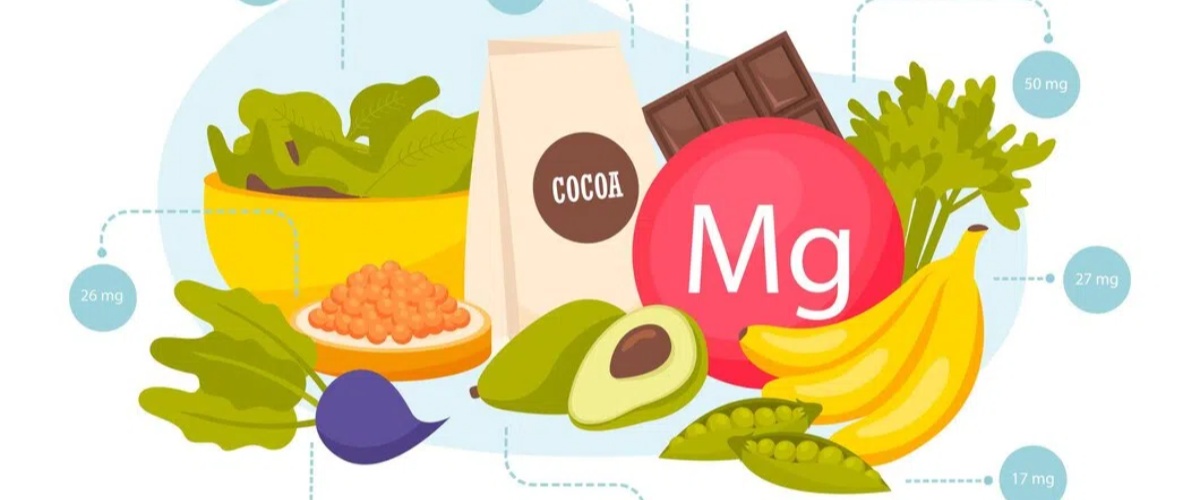Magnesium is an essential mineral that plays a vital role in a variety of body functions, including muscle and nerve function, blood sugar regulation, and bone health. While magnesium can be obtained from foods such as green leafy vegetables, nuts, and whole grains, many people turn to magnesium supplements to ensure they meet their daily needs. However, there are some important things to consider when it comes to magnesium supplements. First, it's important to understand that not all magnesium supplements are created equal. Magnesium comes in different forms, each with its own benefits and absorption rates. Some common forms of magnesium include magnesium threonate, magnesium acetyl taurate, and magnesium taurate. Each form may have different bioavailability, which means the body may absorb and utilize them differently.
Magnesium is an essential mineral and a cofactor for hundreds of enzymes.
Magnesium is involved in nearly all major metabolic and biochemical processes within cells and is responsible for numerous functions in the body, including skeletal development, neuromuscular function, signaling pathways, energy storage and transfer, glucose, lipid and protein metabolism, and DNA and RNA stability. and cell proliferation.
Magnesium plays an important role in the structure and function of the human body. There are approximately 24-29 grams of magnesium in the adult body.
About 50% to 60% of the magnesium in the human body is found in bones, and the remaining 34%-39% is found in soft tissues (muscles and other organs). The magnesium content in the blood is less than 1% of the total body content. Magnesium is the second most abundant intracellular cation after potassium.
1. Magnesium and Bone Health
If you regularly supplement calcium and vitamin D but still have osteoporosis, it must be a magnesium deficiency. There are studies showing that magnesium supplementation (food or dietary supplements) may increase bone mineral density in postmenopausal and older women.
2. Magnesium and diabetes
Increasing magnesium through food and dietary supplements can improve insulin sensitivity and delay the onset of diabetes. Research shows that for every 100 mg increase in magnesium intake, the risk of diabetes decreases by 8-13%. Consuming more magnesium can also reduce sugar cravings.
3. Magnesium and sleep
Adequate magnesium can promote high-quality sleep because magnesium regulates several sleep-related neurotic conditions. GABA (gamma-aminobutyric acid) is a neurotransmitter that helps people achieve calm and deep sleep. But this amino acid that the human body can produce on its own must be stimulated by magnesium to produce it. Without the help of magnesium and low GABA levels in the body, people may suffer from irritability, insomnia, sleep disorders, poor sleep quality, frequent waking up at night, and difficulty falling back asleep...
4. Magnesium and anxiety and depression
Magnesium is a coenzyme that converts tryptophan into serotonin and can increase serotonin levels, so it may be helpful for anxiety and depression.
Studies have shown that magnesium can inhibit stress responses by preventing overexcitation through the neurotransmitter glutamate. Too much glutamate can disrupt brain functioning and has been linked to a variety of mental health conditions. Magnesium helps make enzymes that produce serotonin and melatonin, protecting nerves by regulating the expression of an important protein called brain-derived neurotrophic factor (BDNF), which aids in neuronal plasticity, learning and memory functions.
5. Magnesium and Chronic Inflammation
Many people have at least one type of chronic inflammation. In the past, both animal and human experiments have shown that low magnesium status is related to inflammation and oxidative stress. C-reactive protein is an indicator of mild or chronic inflammation, and more than thirty studies have shown that magnesium intake is inversely associated with elevated C-reactive protein in serum or plasma. Therefore, increased magnesium content in the body can reduce inflammation and even prevent inflammation from worsening, and prevent metabolic syndrome.
6. Magnesium and Gut Health
Magnesium deficiency also affects the balance and diversity of your gut microbiome, and a healthy gut microbiome is essential for normal digestion, nutrient absorption, and overall gut health. Microbiome imbalances have been linked to various gastrointestinal disorders, including inflammatory bowel disease, celiac disease, and irritable bowel syndrome. These intestinal diseases can cause a large loss of magnesium in the body. Magnesium helps prevent leaky gut symptoms by improving the growth, survival, and integrity of intestinal cells.
Additionally, clinical studies have found that magnesium may affect the gut-brain axis, which is the signaling pathway between the digestive tract and the central nervous system, including the brain. An imbalance of gut microbes can lead to anxiety and depression.
7. Magnesium and pain
Magnesium has long been known to relax muscles, and Epsom salt baths were used hundreds of years ago to combat muscle fatigue. Although medical research has not reached a clear conclusion that magnesium can reduce or treat muscle pain problems, in clinical practice, doctors have long given magnesium to patients suffering from migraines and fibromyalgia.
There are studies showing that magnesium supplements can shorten the duration of migraines and reduce the amount of medication needed. The effect will be better when used together with vitamin B2.
8. Magnesium and heart, high blood pressure, and hyperlipidemia
Magnesium may also help improve overall cholesterol levels, which may also help reduce the risk of heart disease.
Symptoms of severe magnesium deficiency include:
• Indifference
• depression
• convulsions
• cramp
• Weakness
Causes of magnesium deficiency:
•Magnesium content in food decreased significantly
66% of people do not get the minimum requirement of magnesium from their diet. Magnesium deficiencies in modern soils lead to magnesium deficiencies in plants and plant-eating animals.
80% of magnesium is lost during food processing. All refined foods contain almost no magnesium.
•No vegetables rich in magnesium
Magnesium is in the center of chlorophyll, the green substance in plants that is responsible for photosynthesis. Plants absorb light and convert it into chemical energy as fuel (such as carbohydrates, proteins). The waste produced by plants during photosynthesis is oxygen, but oxygen is not a waste for humans.
Many people get very little chlorophyll (vegetables) in their diets, but we need more, especially if we are deficient in magnesium.

Magnesium Taurate is a combination of magnesium and taurine, an amino acid that supports cardiovascular health and overall health.
Taurine has been shown to have cardioprotective effects and, when combined with magnesium, can help promote healthy blood pressure and cardiovascular function. Additionally, magnesium taurate may help reduce the risk of cardiac arrhythmias and support overall heart muscle function.
In addition to its cardiovascular benefits, magnesium taurate also promotes relaxation and reduces stress. Magnesium is known for its calming effects on the nervous system, and when combined with taurine, it can help maintain a sense of calm and well-being. This is especially beneficial for those dealing with anxiety or high levels of stress.
In addition, magnesium taurate may support bone health. Magnesium is essential for keeping bones strong and healthy, while taurine has been shown to play a role in bone formation and maintenance. By combining these two nutrients, magnesium taurine can help support bone density and reduce the risk of osteoporosis.
Magnesium and taurine have both been linked to better sleep, and when combined, they can help promote relaxation and support healthy sleep patterns. This is especially beneficial for those who have insomnia or difficulty falling asleep.
A chelated form of magnesium, threonate is a metabolite of vitamin C. It is superior to other forms of magnesium in crossing the blood-brain barrier because of its ability to transport magnesium ions across lipid membranes, including those of brain cells. This compound is particularly effective at increasing magnesium levels in cerebrospinal fluid compared to other forms. Animal models using magnesium threonate have demonstrated the compound's promise in protecting neuroplasticity in the brain and supporting synaptic density, which may contribute to better cognitive function and enhanced memory.
Several studies have shown that synaptic connections in the brain's hippocampus, a key brain region for learning and memory, decline with aging. Studies have also found that people with Alzheimer's disease have lower levels of magnesium in their brains. Magnesium threonate has been found in animal studies to improve learning, working memory, and short- and long-term memory.
Magnesium threonate enhances hippocampal function by improving synaptic plasticity and NMDA (N-methyl-D-aspartate) receptor-dependent signaling. MIT researchers concluded that increasing brain magnesium levels using magnesium threonate may be beneficial in enhancing cognitive performance and preventing age-related memory decline.
Increasing plasticity in the brain's prefrontal cortex and amygdala can improve memory, as these brain areas are also deeply involved in mediating the effects of stress on memory. Therefore, this magnesium chelate may be beneficial for age-related cognitive decline. It has also been shown to prevent short-term memory decline associated with neuropathic pain.
Magnesium Acetyl Taurate is a combination of magnesium and acetyl taurine, a derivative of the amino acid taurine. This unique compound provides a more bioavailable form of magnesium that is better absorbed and utilized by the body. Unlike other forms of magnesium, Magnesium Acetyl Taurate is thought to cross the blood-brain barrier more efficiently and may provide cognitive benefits in addition to traditional health benefits.
Research shows that this form of magnesium may help regulate blood pressure and improve overall heart function. Additionally, it may have a positive impact on lipid metabolism, further promoting heart health.
Additionally, the combination of magnesium and acetyl taurine may have neuroprotective effects that may help prevent cognitive decline and support overall brain health. This makes it a promising option for individuals who want to support their cognitive function as they age.
Magnesium Acetyl Taurate also helps support overall muscle function and relaxation. It may help relieve muscle spasms and spasms, making it a popular choice for athletes and individuals with active lifestyles. Additionally, its calming effect on the nervous system helps improve sleep quality and stress management.
4. Magnesium citrate
Magnesium citrate is one of the most popular forms of magnesium supplements due to its high bioavailability and effectiveness. It is easily absorbed by the body and is an excellent choice for those suffering from magnesium deficiencies or those looking to support overall health. Magnesium citrate is also known for its mild laxative effects, making it a top choice for people suffering from constipation.
5. Magnesium oxide
Magnesium oxide is a common form of magnesium that is often used to support overall magnesium levels in the body. Although the amount of magnesium per dose is higher, it is less bioavailable than other forms of magnesium, meaning a larger dose is required to achieve the same effect. Due to its lower absorption rate, magnesium oxide may not be the best choice for people with digestive issues or those seeking quick relief from magnesium deficiency symptoms.

Chelated magnesium is magnesium bound to amino acids or organic molecules. This binding process is called chelation, and its purpose is to enhance the absorption and bioavailability of minerals. Chelated magnesium is often touted for its better absorption compared to non-chelated forms. Some common forms of chelated magnesium include magnesium threonate, magnesium taurate, and magnesium citrate. Among them, Suzhou Mailun provides large quantities of high-purity magnesium threonate, magnesium taurate and magnesium acetyl taurate.
Unchelated magnesium, on the other hand, refers to magnesium that is not bound to amino acids or organic molecules. This form of magnesium is commonly found in mineral salts such as magnesium oxide, magnesium sulfate, and magnesium carbonate. Non-chelated magnesium supplements are generally less expensive than chelated forms, but they may be less easily absorbed by the body.
One of the main differences between chelated and unchelated magnesium is their bioavailability. Chelated magnesium is generally considered to be more bioavailable, meaning a greater proportion of the magnesium is absorbed and utilized by the body. This is due to the chelation process, which helps protect magnesium from degradation in the digestive system and facilitates its transport across the intestinal wall.
In contrast, non-chelated magnesium may be less bioavailable because the magnesium ions are not effectively protected and may bind more readily to other compounds in the digestive tract, reducing their absorption. Therefore, individuals may need to take higher doses of unchelated magnesium to achieve the same level of absorption as the chelated form.
Another important factor to consider when choosing between chelated and unchelated magnesium is their potential to cause gastrointestinal discomfort. Chelated forms of magnesium are generally well tolerated and less likely to cause digestive upset, making them a first choice for people with sensitive stomachs. Non-chelated forms, especially magnesium oxide, are known for their laxative effects and may cause diarrhea or abdominal discomfort in some people.
Factors to Consider When Choosing Magnesium Supplements
1. Bioavailability: Look for magnesium supplements with high bioavailability to ensure your body can effectively absorb and utilize the magnesium.
2. Purity and Quality: Choose supplements from reputable brands that have been third-party tested to ensure purity and quality. Look for supplements that are free of fillers, additives, and artificial ingredients.
3. Dosage: Consider the dosage of your supplement and make sure it meets your personal needs. Some people may need higher or lower doses of magnesium based on age, gender and health.
4. Dosage Form: Based on your personal preference and convenience, decide whether you prefer capsules, tablets, powder, or topical magnesium.
5. Other Ingredients: Some magnesium supplements may contain other ingredients, such as vitamin D, calcium, or other minerals, that can enhance the overall effectiveness of the supplement.
6. Health Goals: Consider your specific health goals when choosing a magnesium supplement. Whether you want to support bone health, improve sleep quality, or relieve muscle spasms, there's a magnesium supplement to suit your needs.
In today's health-conscious world, the demand for high-quality dietary supplements continues to increase. Of these supplements, magnesium has received widespread attention for its numerous health benefits, including supporting bone health, muscle function, and overall health. Therefore, the magnesium supplement market is booming, and finding the best magnesium supplement manufacturer is crucial to ensure the efficacy and safety of the product.
So, how do you find the best magnesium supplement manufacturer?
1. Quality and Purity of Ingredients
When it comes to dietary supplements, the quality and purity of the ingredients used are crucial. Find a magnesium supplement manufacturer that sources raw materials from reputable suppliers and conducts thorough testing to ensure the purity and potency of the ingredients. Additionally, certifications such as Good Manufacturing Practices (GMP) and third-party testing ensure product quality and safety.
2. Research and development capabilities
A reputable magnesium supplement manufacturer should have strong research and development capabilities to stay at the forefront of scientific advancement and innovation in the industry. Look for manufacturers who invest in research to develop new and improved formulas, and those who work with experts in the nutrition and health fields to ensure their products are backed by scientific evidence.
3. Production technology and equipment
A magnesium supplement manufacturer's manufacturing processes and facilities play a key role in ensuring the quality and consistency of their products. Look for manufacturers that adhere to strict quality control measures and have state-of-the-art facilities that meet industry standards. Additionally, transparency in the manufacturing process, such as providing information on sourcing, production and testing, can increase confidence in product integrity.
4. Customization and formulation expertise
Everyone's nutritional needs are unique, and a reputable magnesium supplement manufacturer should have the expertise to customize formulas to meet specific requirements. Whether developing specialized formulas for different groups of people or addressing specific health concerns, manufacturers with formulation expertise can provide tailored solutions to meet the needs of different consumers.
5. Regulatory Compliance and Certification
When choosing a magnesium supplement manufacturer, compliance with regulatory standards and certifications cannot be ignored. Look for manufacturers that comply with regulations set by authoritative agencies such as the U.S. Food and Drug Administration (FDA) and have certifications from reputable organizations. This ensures the product meets strict quality and safety standards, giving you peace of mind about its efficacy and safety.
6. Reputation and track record
A manufacturer's reputation and track record in the industry demonstrates reliability and commitment to quality. Look for manufacturers with a good reputation, positive customer reviews, and a track record of producing high-quality supplements. Additionally, partnerships with well-known brands and industry recognition can further validate a manufacturer’s credibility.
7. Commitment to sustainable development and ethical practices
In today's environmentally conscious world, consumers are increasingly seeking products from manufacturers that prioritize sustainability and ethical practices. Look for magnesium supplement manufacturers committed to sustainable sourcing, eco-friendly packaging, and ethical business practices. This demonstrates the manufacturer’s commitment to minimizing environmental impact and contributing to a healthier planet.
Suzhou Myland Pharm & Nutrition Inc. has been engaged in the nutritional supplement business since 1992. It is the first company in China to develop and commercialize grape seed extract.
With 30 years of experience and driven by high technology and a highly optimized R&D strategy, the company has developed a range of competitive products and become an innovative life science supplement, custom synthesis and manufacturing services company.
In addition, Suzhou Myland Pharm & Nutrition Inc. is also an FDA-registered manufacturer. The company's R&D resources, production facilities, and analytical instruments are modern and multifunctional and can produce chemicals from milligrams to tons in scale, and comply with ISO 9001 standards and production specifications GMP.
Q:What are the benefits of taking magnesium supplements?
A:Taking magnesium supplements can help support bone health, muscle function, and heart health. It may also help with relaxation and sleep, as well as support overall energy levels.
Q:How much magnesium should I take daily?
A:The recommended daily allowance for magnesium varies by age and gender, but generally ranges from 300-400 mg for adults. It's important to consult with a healthcare professional to determine the appropriate dosage for your individual needs.
Q:Can magnesium supplements interact with other medications?
A:Magnesium supplements can interact with certain medications, such as antibiotics, diuretics, and some osteoporosis medications. It's important to discuss any potential interactions with your healthcare provider before starting magnesium supplementation.
Q:What are the best sources of magnesium in food?
A:Some of the best food sources of magnesium include leafy green vegetables, nuts and seeds, whole grains, and legumes. Incorporating these foods into your diet can help ensure you're getting an adequate amount of magnesium without the need for supplementation.
Disclaimer: This article is for general information only and should not be construed as any medical advice. Some of the blog post information comes from the Internet and is not professional. This website is only responsible for sorting, formatting and editing articles. The purpose of conveying more information does not mean that you agree with its views or confirm the authenticity of its content. Always consult a health care professional before using any supplements or making changes to your health care regimen.
Post time: Aug-21-2024






